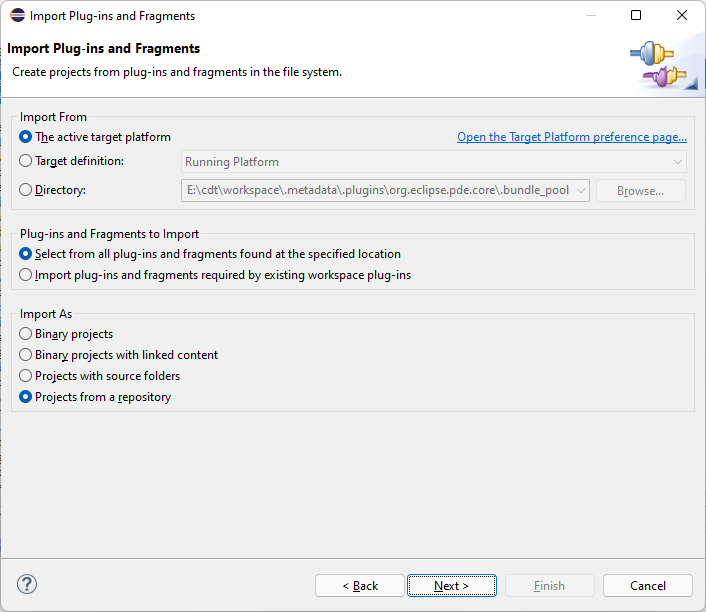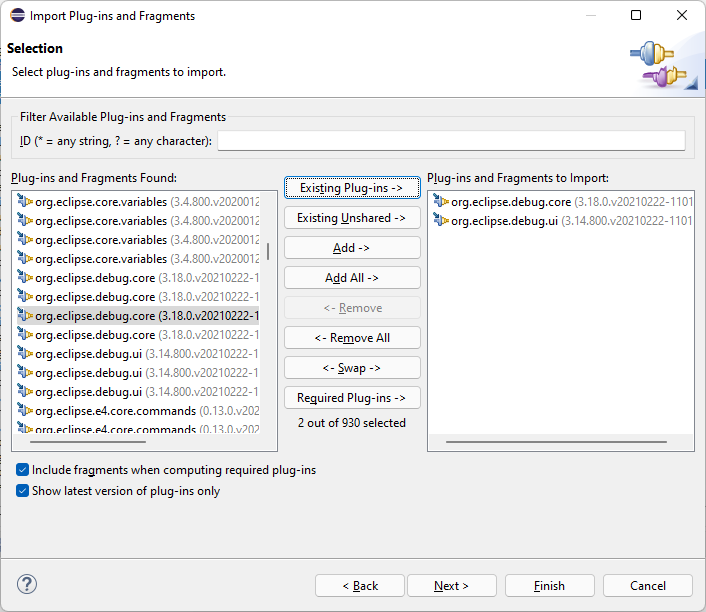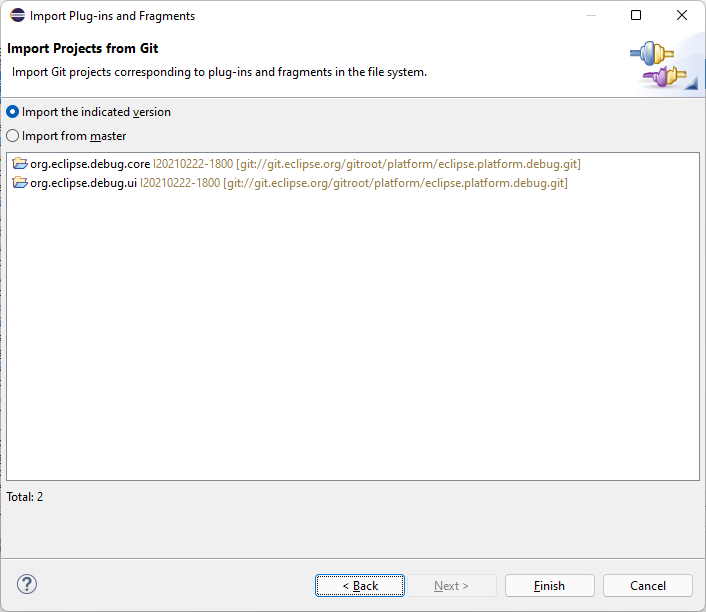Notice: this Wiki will be going read only early in 2024 and edits will no longer be possible. Please see: https://gitlab.eclipse.org/eclipsefdn/helpdesk/-/wikis/Wiki-shutdown-plan for the plan.
Difference between revisions of "PDE/UI/SourceReferences"
(→Implementation) |
(Remove most of the dated CVS references and update to Git. See Bug 574076 Comment 20) |
||
| (11 intermediate revisions by 4 users not shown) | |||
| Line 1: | Line 1: | ||
== Eclipse Source Reference Headers == | == Eclipse Source Reference Headers == | ||
| − | + | PDE supports '''Eclipse-SourceReferences''' headers to bundle manifests. The header provides a list of [http://maven.apache.org/scm/scm-url-format.html SCMURLs] that reference the source code associated with a binary bundle. PDE build has extensible support for generating source reference headers and the IDE supports importing projects into the workspace corresponding to headers. Usually a bundle has only one SCMURL associated with it. For example, following is a header included in the "org.eclipse.debug.ui" bundle from the Eclipse 4.19 release: | |
| − | <code>Eclipse-SourceReferences: scm: | + | <code>Eclipse-SourceReferences: scm:git:git://git.eclipse.org/gitroot/platform/eclipse.platform.debug.git;path="org.eclipse.debug.ui";tag="I20210222-1800";commitId=c239e1061cd3e02c6e3cb7f34b2be0be7fea7355</code> |
| − | + | Support to generate headers and import from different repositories is extensible. The Eclipse SDK provides support for Git via the eGit project. | |
| − | The SCMURLs generated in the Eclipse SDK refer to projects in the Eclipse | + | == Importing Projects from Git == |
| + | |||
| + | The SCMURLs generated in the Eclipse SDK refer to projects in the Eclipse GIT repository. To import projects from GIT use PDE's import wizard (use the '''File > Import''' action and select '''Plug-in Development > Plug-ins and Fragments''' on the first page of the import wizard). For this example, we'll import from the active target platform. Choose the '''Projects from a repository''' radio button at the bottom of the wizard page and press '''Next'''. | ||
[[Image:Repo-import-1.png]] | [[Image:Repo-import-1.png]] | ||
| Line 15: | Line 17: | ||
[[Image:Repo-import-2.png]] | [[Image:Repo-import-2.png]] | ||
| − | The last page of the wizard allows you to import the specific versions of the projects that were used in the build or from | + | The last page of the wizard allows you to import the specific versions of the projects that were used in the build or from latest version. Pressing '''Finish''' imports the projects into the workspace, connected to the GIt repository. |
[[Image:Repo-import-3.png]] | [[Image:Repo-import-3.png]] | ||
| − | == Generating Source Reference Headers | + | == Extensibility: Generating and Importing Source Reference Headers == |
PDE build optionally generates source reference headers during a build. This feature is turned on by specifying the following property: | PDE build optionally generates source reference headers during a build. This feature is turned on by specifying the following property: | ||
| Line 28: | Line 30: | ||
For example, the CVS fetch factory implementation sets a {key, value} pair in the map for each project being fetched, like: | For example, the CVS fetch factory implementation sets a {key, value} pair in the map for each project being fetched, like: | ||
| + | |||
| + | <code>{"sourceReferences", "Eclipse-SourceReferences: scm:cvs:pserver:dev.eclipse.org:/cvsroot/eclipse:org.eclipse.debug.core;tag=v20100427"}</code> | ||
| + | |||
| + | PDE provides two new '''experimental / internal''' extension points to support import operations in the SDK: | ||
| + | |||
| + | * ''org.eclipse.pde.core.bundleImporters'' - A bundle importer is capable of creating a project in the workspace based on specific entries contained in a bundle manifest (implements '''org.eclipse.pde.internal.core.importing.provisional.IBundleImporterDelegate'''). A bundle importer is provided with the manifest (map of header value pairs) of each bundle. For each bundle that the importer supports, it creates and returns a bundle import description (org.eclipse.pde.internal.core.importing.provisional.BundleImportDescription). | ||
| + | * ''org.eclipse.pde.ui.bundleImportPages'' - A bundle import page provides a wizard page used in the Plug-in import wizard to configure settings for bundles to be imported by a bundle importer extension (implements '''org.eclipse.pde.internal.ui.provisional.IBundeImportWizardPage'''). The page is provided with any bundle import descriptions associated with bundles the user has selected for import. The page can then modify/annotate/further restrict the bundle import descriptions. The resulting importing descriptions are passed to the bundle importer when finish is pressed. | ||
| + | |||
| + | Since the extension points are experimental the interfaces implemented by the extensions are in the internal (non-API) namespace. The SDK provides implementations of all three extensions for CVS. For example, the CVS bundle import page adds information to bundle import descriptions if the user decides to import from HEAD. The eGit projects provides implementations for Git. | ||
| + | |||
| + | === Generating Source Reference Headers with Tycho === | ||
| + | |||
| + | Source reference headers can also be generated with Tycho with [https://www.eclipse.org/tycho/sitedocs/tycho-packaging-plugin/package-plugin-mojo.html tycho-packaging:package-plugin]. | ||
| + | |||
| + | For example, if a project is located in Eclipse's Git repos add a property with the SCM URL like this: | ||
| + | |||
| + | <pre> | ||
| + | <properties> | ||
| + | <tycho.scmUrl>scm:git:git://git.eclipse.org/gitroot/cdt/org.eclipse.cdt.git</tycho.scmUrl> | ||
| + | </properties> | ||
| + | </pre> | ||
| + | |||
| + | For a repository located on GitHub the equivalent property would look like: | ||
| + | <pre> | ||
| + | <properties> | ||
| + | <tycho.scmUrl>scm:git:https://github.com/eclipse/january.git</tycho.scmUrl> | ||
| + | </properties> | ||
| + | </pre> | ||
| + | |||
| + | Then add the packaging plug-in to the build: | ||
| + | |||
| + | <pre> | ||
| + | <build> | ||
| + | <plugins> | ||
| + | <plugin> | ||
| + | <groupId>org.eclipse.tycho</groupId> | ||
| + | <artifactId>tycho-packaging-plugin</artifactId> | ||
| + | <version>${tycho-version}</version> | ||
| + | <dependencies> | ||
| + | <!-- Use jgit to resolve source references for git: type SCM --> | ||
| + | <dependency> | ||
| + | <groupId>org.eclipse.tycho.extras</groupId> | ||
| + | <artifactId>tycho-sourceref-jgit</artifactId> | ||
| + | <version>${tycho-extras-version}</version> | ||
| + | </dependency> | ||
| + | </dependencies> | ||
| + | <configuration> | ||
| + | <sourceReferences> | ||
| + | <!-- Generate the source reference in the MANIFEST.MF --> | ||
| + | <generate>true</generate> | ||
| + | </sourceReferences> | ||
| + | </configuration> | ||
| + | </plugin> | ||
| + | </plugins> | ||
| + | </build> | ||
| + | </pre> | ||
| + | |||
| + | |||
| + | [[Category:PDE]][[Category:PDE/Build|Source References]] | ||
Latest revision as of 15:26, 9 August 2021
Contents
Eclipse Source Reference Headers
PDE supports Eclipse-SourceReferences headers to bundle manifests. The header provides a list of SCMURLs that reference the source code associated with a binary bundle. PDE build has extensible support for generating source reference headers and the IDE supports importing projects into the workspace corresponding to headers. Usually a bundle has only one SCMURL associated with it. For example, following is a header included in the "org.eclipse.debug.ui" bundle from the Eclipse 4.19 release:
Eclipse-SourceReferences: scm:git:git://git.eclipse.org/gitroot/platform/eclipse.platform.debug.git;path="org.eclipse.debug.ui";tag="I20210222-1800";commitId=c239e1061cd3e02c6e3cb7f34b2be0be7fea7355
Support to generate headers and import from different repositories is extensible. The Eclipse SDK provides support for Git via the eGit project.
Importing Projects from Git
The SCMURLs generated in the Eclipse SDK refer to projects in the Eclipse GIT repository. To import projects from GIT use PDE's import wizard (use the File > Import action and select Plug-in Development > Plug-ins and Fragments on the first page of the import wizard). For this example, we'll import from the active target platform. Choose the Projects from a repository radio button at the bottom of the wizard page and press Next.
All bundles with published SCMURLs will be available for importing. Select the bundles you want to import, and press Next. For this example, I have selected bundles related to the debug platform.
The last page of the wizard allows you to import the specific versions of the projects that were used in the build or from latest version. Pressing Finish imports the projects into the workspace, connected to the GIt repository.
Extensibility: Generating and Importing Source Reference Headers
PDE build optionally generates source reference headers during a build. This feature is turned on by specifying the following property:
generateSourceReferences = true
The headers themselves are generated by fetch factories. PDE build uses fetch factories to fetch source code from repositories (there is an org.eclipse.pde.build.fetchFactories extension point). Each repository (CVS, etc.), provides a specific implementation of an IFetchFactory. To include source reference headers a fetch factory must provide a KEY_SOURCE_REFERENCES property when parsing a map file entry, in the implementation of parseMapFileEntry(String, Properties, Map).
For example, the CVS fetch factory implementation sets a {key, value} pair in the map for each project being fetched, like:
{"sourceReferences", "Eclipse-SourceReferences: scm:cvs:pserver:dev.eclipse.org:/cvsroot/eclipse:org.eclipse.debug.core;tag=v20100427"}
PDE provides two new experimental / internal extension points to support import operations in the SDK:
- org.eclipse.pde.core.bundleImporters - A bundle importer is capable of creating a project in the workspace based on specific entries contained in a bundle manifest (implements org.eclipse.pde.internal.core.importing.provisional.IBundleImporterDelegate). A bundle importer is provided with the manifest (map of header value pairs) of each bundle. For each bundle that the importer supports, it creates and returns a bundle import description (org.eclipse.pde.internal.core.importing.provisional.BundleImportDescription).
- org.eclipse.pde.ui.bundleImportPages - A bundle import page provides a wizard page used in the Plug-in import wizard to configure settings for bundles to be imported by a bundle importer extension (implements org.eclipse.pde.internal.ui.provisional.IBundeImportWizardPage). The page is provided with any bundle import descriptions associated with bundles the user has selected for import. The page can then modify/annotate/further restrict the bundle import descriptions. The resulting importing descriptions are passed to the bundle importer when finish is pressed.
Since the extension points are experimental the interfaces implemented by the extensions are in the internal (non-API) namespace. The SDK provides implementations of all three extensions for CVS. For example, the CVS bundle import page adds information to bundle import descriptions if the user decides to import from HEAD. The eGit projects provides implementations for Git.
Generating Source Reference Headers with Tycho
Source reference headers can also be generated with Tycho with tycho-packaging:package-plugin.
For example, if a project is located in Eclipse's Git repos add a property with the SCM URL like this:
<properties>
<tycho.scmUrl>scm:git:git://git.eclipse.org/gitroot/cdt/org.eclipse.cdt.git</tycho.scmUrl>
</properties>
For a repository located on GitHub the equivalent property would look like:
<properties>
<tycho.scmUrl>scm:git:https://github.com/eclipse/january.git</tycho.scmUrl>
</properties>
Then add the packaging plug-in to the build:
<build>
<plugins>
<plugin>
<groupId>org.eclipse.tycho</groupId>
<artifactId>tycho-packaging-plugin</artifactId>
<version>${tycho-version}</version>
<dependencies>
<!-- Use jgit to resolve source references for git: type SCM -->
<dependency>
<groupId>org.eclipse.tycho.extras</groupId>
<artifactId>tycho-sourceref-jgit</artifactId>
<version>${tycho-extras-version}</version>
</dependency>
</dependencies>
<configuration>
<sourceReferences>
<!-- Generate the source reference in the MANIFEST.MF -->
<generate>true</generate>
</sourceReferences>
</configuration>
</plugin>
</plugins>
</build>



